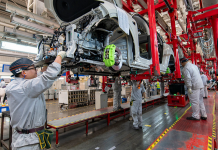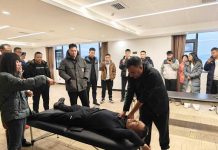HAIKOU: Fu Shunmei was thrilled to learn that her expenses for labor pain relief procedure at the First Affiliated Hospital of Hainan Medical University were largely covered by insurance, greatly easing her financial burden.
The hospital is one of the pilot medical institutions in the southern island province of Hainan to offer labor pain relief, which is now covered by health insurance.
“Now I only have to pay around 300 yuan ($42) for what should have cost me 2,000 yuan, a huge saving that really takes the pressure off,” Fu said.
Hainan joined many other regions across the country in August in adding suitable labor pain relief to the health insurance reimbursement list. China launched an initiative in 2018 to promote labor pain relief in pilot hospitals, with some regions beginning to offer medical insurance reimbursement for the procedure in 2021.
“The majority of costs incurred during childbirth can be covered by the medical insurance fund. The expansion of this initiative directly benefits pregnant women as it significantly reduces medical expenses,” said Ye Yun, a researcher at the Hainan Institute of Medical Security.
Since Hainan added suitable labor pain relief to its medical coverage, the number of women opting for the procedure has doubled. This figure is expected to rise further as more women choose pain management, making childbirth a less daunting experience, according to the Hainan Women and Children’s Medical Center.
In October, the State Council issued a directive outlining 13 targeted measures to improve childbirth support services, expand childcare systems, enhance support in education, housing and employment, and foster a birth-friendly social environment.
Notably, suitable labor pain relief and assisted reproductive technology services will be included in the list of medical procedures eligible for insurance reimbursement, according to the directive.
A 2022 study by the National Health Commission revealed that China’s adoption rate for labor pain relief was 30 percent, significantly lower than the 80 to 90 percent observed in developed countries. Factors such as high patient costs, a shortage of anesthetists and the need for additional hospital staff and resources have contributed to the lower rates, according to Ye.
Speaking to Xinhua, Ye said the move can help improve the childbirth support system and optimize population development strategies.
The program aims to encourage more patients to choose labor pain relief, reducing postpartum depression and promoting family harmony to foster a childbirth-friendly society, while hospitals should also be encouraged to allocate additional resources to support this service, Ye added. –The Daily Mail-China Daily news exchange item






